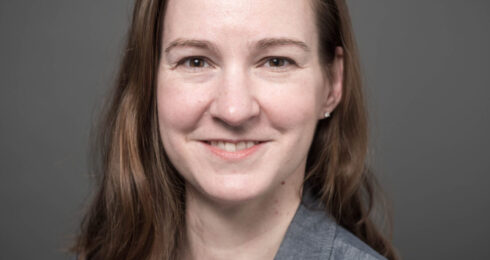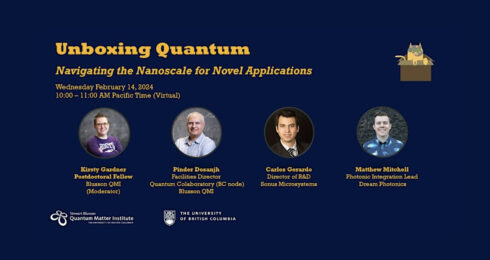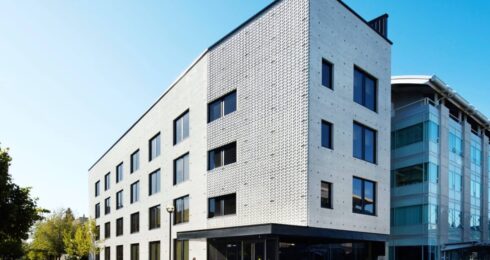With big changes and very little certainty about what the months ahead would look like – or what would be possible as the COVID-19 pandemic wore on – much of our annual summer programming looked a lot different in 2020. Programs that traditionally engaged in-person audiences were forced to adapt to virtual spaces, turning months of planning for in-person summer programs into remote learning opportunities for knowledge users including undergraduate students, K-12 teachers, local kids, and even our own families and friends.
,
Quantum Pathways, skills training, Quantum Computing Outreach and UBC Geering Up, and informal get-togethers went digital, and new ideas emerged. For program leads including Natalia Bussard, Haris Amiri, and Alex Anees, these were unprecedented times demanding unconventional thinking and abrupt shifts; the resulting programs were successful not in spite of the conditions surrounding the pandemic, but because of the resilience and flexibility of our outreach leads.
,
Quantum Pathways
,
By March, planning for summer programs for Quantum Pathways students was already well underway, and the closure of laboratory spaces presented a huge challenge for supervisors, mentors and program participants themselves. The Quantum Pathways program at the Stewart Blusson Quantum Matter Institute (SBQMI) is designed to engage groups who are underrepresented in physics and related fields, with one of the major features of the program being hands-on opportunities for undergraduate students to learn research and laboratory skills.
,
“Transferring a highly experimental program into a purely theoretical online environment was challenging, but thanks to tremendous encouragement from Andrea Damascelli and Doug Bonn, as well as the students’ eagerness to continue with the program, we were able to take this huge challenge on and were able to provide the students with valuable experiences,” said Bussard, Manager of Programs and Careers at SBQMI.
,
Students worked on theoretical physics projects, honing their Matlab and Python skills, or advised faculty and assisted them in moving historically in-person undergraduate academic programming online. While it wasn’t exactly how anyone expected to spend their summer terms, it proved a valuable learning experience for many.
,
“I would like to express huge thank you to principal investigators Mona Berciu, Marcel Franz, Doug Bonn, Sarah Burke, Alannah Hallas, Joe Salfi, Meigan Aronson, Alireza Nojeh, Lukas Chrostowski, and Jeff Young,” said Bussard. “Of course, the program could not take place without supervision of excellent graduate student mentors: thank you to Mohammad Oudah, Etienne Lantagne-Hurtubise, Rafael Haenel, Amy Qu, Ashley Warner, and Brandon Stuart.”
,
Summer Experimental Skills Workshops
,
While Quantum Pathways is just for undergraduate students, our summer experimental skills workshops are for everyone; while in the past these have involved opportunities to learn new lab techniques in-person, our experts were forced to get creative, designing informative sessions and teaching research skills over Zoom.
,
Workshops ranged from “Making Scientific Figures with Illustrator” and “Making Scientific Art with Blender,” both shared on YouTube by Christopher Gutierrez, former Damascelli lab postdoctoral fellow who is now an Assistant Professor at UCLA, to “Lithography and Patterning” with Matthias Kroug and “Computer-aided Design of Mask Layouts” with Kostis Michelakis.
,
“I really appreciated the excellent quality of the workshops given out by our presenters, as well as the enthusiastic participation of students and staff,” said Bussard.
,
Quantum Computing Outreach and Geering Up
,
“This summer, we reached 324 youth through live streams and online summer camps,” said Haris Amiri, Project Manager, Quantum Computing Outreach and UBC’s Geering Up program. “We had to adapt pretty quickly, but we were able to pivot to remote learning and offered our first ever online quantum computing summer camps for kids in grades 6 through 12.”
,
- ,
- Related: UBC Geering Up Online Resources – during COVID-19
,
,
By bringing educational activities and programming to kids online, quantum computing experiences were more accessible to kids in remote areas of British Columbia. But it wasn’t all for kids – in addition to online summer camps, Amiri and colleagues with Geering Up and the Quantum Computing Outreach Program (QCOP) ran virtual workshops on quantum computing for First Nations communities in the Cariboo Regional District. Launched with support from Canada’s Digital Technology Supercluster, the QCOP is working to build diversity in the field of quantum computing, and the urgency to develop robust online programming will have lasting benefits, putting quantum computing education and experiences within reach for a greater number of interested learners.
,
Adaptation led to expansion, and by June, the QCOP was able to hire three UBC co-op students to develop new software, offer paid part-time positions to three graduate students, and worked with 11 undergraduate students.
,
“We were also excited to offer three-week internships to two Indigenous high school students this summer to work on curriculum development for the Quantum Computing Outreach program,” said Amiri.
,
The teams worked to develop a number of games and apps to make quantum computing fun.
,
“Our team built a hub of web applications that allow players to make use of D-Wave’s 2000Q solver via games, sudoku solvers, and a ‘travelling salesperson’ app,” said Amiri. “We also created a ‘Quantum Navigator’ 8-bit video game for kids that introduces key quantum concepts such as entanglement, quantum teleportation, decoherence, and qubits.”
,
,
,
,
And there’s more to come. While the pandemic forced a certain amount of creativity, it also enabled Amiri and team to see new opportunities for growth; looking ahead, the team plans to launch the Quantum Bits Podcast!, hosted by SBQMI PhD student Parham Pashaei. Pashei will use his platform to interview industry experts in quantum computing from places like Alphabet and D-Wave, etc.
,
They’re also developing a mobile application that will allow users to play games on real quantum computers; the Quantum Arcade mobile app will enable players to use D-Wave’s QPU in a way that “gamifies” quantum computing education.
,
SBQMI Family & Friends seminars
,

,
Developed by Alex Anees, Research Operations Facilitator, based on an idea proposed by Andrea Damascelli and former Chief Operations Officer Vis Naidoo, the program was originally intended to be an in-person event; the first in the series launched online in April, featuring Research Associate James Day and his daughter, Zoey, as they explained the physics of how materials behave at low temperatures.
,
“It was an opportunity to make what can often seem like esoteric concepts familiar and interesting to our whole community,” said Anees. “These weren’t lectures; they were meant to be more like social events.”
,
,
,
,
The talks featured researchers, students and scientific staff presenting big ideas in condensed matter physics and quantum computing in accessible, lay-friendly terms. From their living room couches or dining room tables, speakers fielded questions from staff. students, researchers from other areas of study and, occasionally, from curious school-aged children.
,
“A lot of what we do requires a base level of knowledge. What is ARPES, for example? How do we image electrons? These are fascinating topics, but people who haven’t done a PhD in physics may not have been exposed to these ideas,” said Anees. “And for those who maybe aren’t experts in these areas, this is an opportunity to connect with the research we’re supporting through our work.”
,
“It has been exciting to see familiar faces from across our community mixed in with some new, certainly younger faces than we usually see at our talks,” said Damascelli. “Thank you to Alex for his work in bringing this series to fruition!”
,
The series continues to draw engaged audiences and fresh faces; if you are an SBQMI community member and would like to present your work, please email Alex at alex.anees@ubc.ca.


